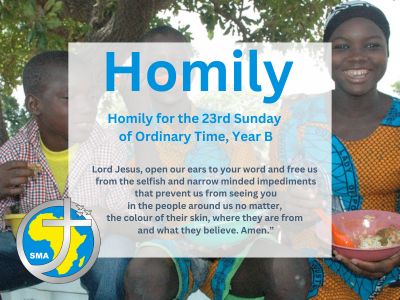Readings: Isaiah 35:4-7, James 2:1-5 and Mark 7:31-37.
In the gospel today Jesus meets a man who is deaf and also has a speech impediment. We note the sensitivity of Jesus. He takes the man apart in order to cure him. We see the gentleness of Jesus in dealing with the man in a very personal and caring way. He doesn’t want to embarrass him and treats him as a human being – thus deserving of respect and gentleness.
However, more than a physical healing Jesus allows him to go back into society, freed to participate in all social and religious activities. The fact is that at the time of Jesus deafness and the inability to speak were seen as punishments from God. So in healing him, Jesus not only restores his physical wellbeing, he also removes the social and religious taboos that excluded and marginalised him in society.
In the text, the man healed is not named suggesting that the he stands for all of us, who need to have our ears opened to God’s Word and be freed from things that harm us. As a people open to and really hearing the word of God, Christians should show solidarity with those who suffer physically and socially. Today, an obvious situation is how we treat immigrants, and people with disabilities. Very often, they are rejected, treated with suspicion and ostracised.
The events in today’s gospel, took place in Decapolis, which was a gentile or non-Jewish territory showing that Jesus ministry was open to all peoples irrespective of religious or other labels. This is an example for us his followers and an invitation to engage with those living among us who we see as “different”, perhaps neighbours who are immigrants, people of other faiths or who are different in other ways.
Jesus has gone back to his heavenly Father and he leaves the work of opening the ears of the deaf and removing impediments to Christian living to us. Perhaps we should begin with ourselves. In saying to the deaf man, ‘ Ephphatha’ that is ‘Be opened’ Jesus is also addressing the same words to us – ‘Be opened’ – open to the humanity and goodness of other people, to seeing their inherent value, the talents and gifts they bring rather than viewing them as “other” or a “threat”.
For sure the deaf man in the Gospel stands for each of us. God speaks to us daily through others in so many ways. We can choose to hear what He is saying and we can choose to keep our lips free from the negative and judgemental comments that sow division and build impediments to the solidarity and love that are central to Christian living.
Lord Jesus, open our ears to your word and free us from the selfish and narrow minded impediments that prevent us from seeing you in the people around us no matter, the colour of their skin, where they are from and what they believe. Amen.”
Edited from a homily by the late Fr Jim Kirstein, SMA (RIP)

